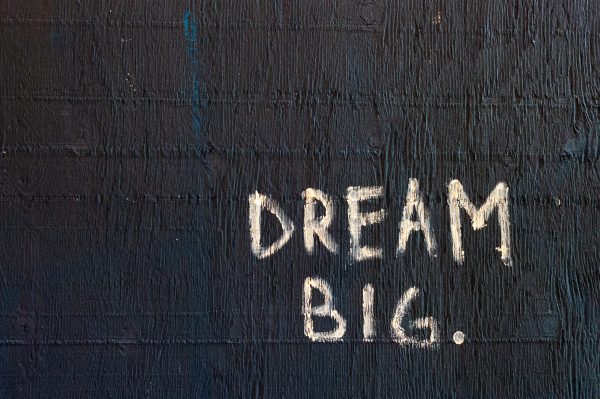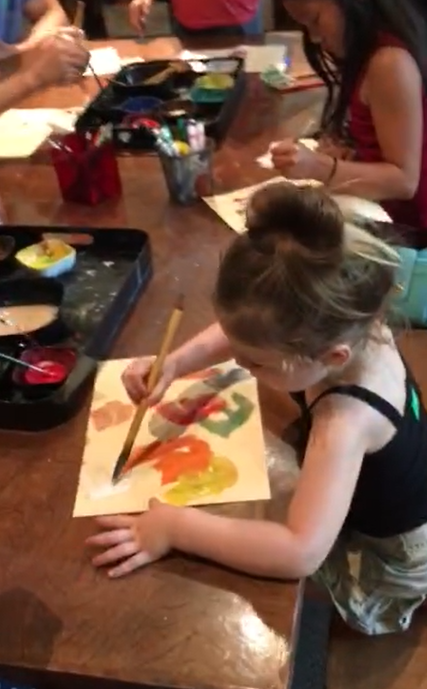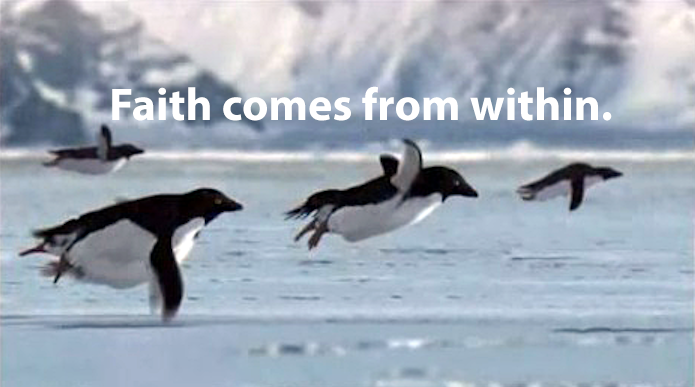
The dictionary says that ‘faith’ is:
complete trust or confidence in someone or something.
What it does not say, is that there’s no guarantee that they or it will work to your benefit.
Faith and philosophy are intertwined.
Faith is a commitment to trusting in something whether we know it to be true or not. We have faith that the sun will always rise. We have faith that when we flip the switch the lights will come on. And then there’s the philosophical faith in things unseen and unproven… The existence of God, electricity, the air we breathe, the airwaves that provide radio, television, Wi-Fi, and the Internet, or the faith that our hearts will keep on beating…
Nothing is written in absolutes, yet we have faith that these things will continue to be, work, and provide.
But when it comes to building a business, making a profit, or creating a new invention, product, concept, or inspired idea, we have to have more than faith in the unknown. We must have complete faith in ourselves.
And that’s where motivation comes into play.
Motivation is the driver that keeps us pushing past the struggle of the unknown. It gives us fortitude when doubt and common sense make us question our choices. And it helps us to focus our attention and energy on the project at hand, long after others have given up.
Initially, motivation comes from the spark of an idea or something that fosters passion within us. Some idea, concept, or unique observation provides the fuel that ignites both our attention and our desire. It motivates us to trust in the unknown, providing us the energy to pursue the mysterious and see where it leads.

Design by Randy Tarampi
Children are natural at this. Since there is so much in the world that is new to them, they are willing to experiment and see where their ideas lead. What happens if I mix honey and sand? What will result if I empty out an entire bottle of bubble bath into the tub? How high can I bounce on my bed? If I put blue toothpaste in water, can I dip a white flower into the mixture and make the flower turn blue?
Kids love to experiment. The unknown motivates them, fostering their creative spirit. When it comes to curiosity, nothing is out of bounds. And pretending only adds to the level of experimentation they’re willing to take on.

As children, we are bold in our ability to try new things. As young adults, we are still willing and able to venture farther than conventional wisdom dictates. But when we’ve had more life experience and been kicked around a few times by reality, many are less likely to be motivated by risk, especially when risk can equate to loss of time, money, resources, and sometimes support.
When it comes to motivation, there are only two roads… The road unknown, and the road to safety and security.
The road to safety and security is often tied to a goal, result, or endgame:
“If I clean the house now, I can watch the football game the rest of the day, undisturbed.”
The road unknown, however, is the bigger motivator. It is riskier, more challenging, and usually has no prior verifiable proof that it is even a good path to pursue.
So why would someone want to take such a risk?
And even risk has its levels of comfort. Risk can be minimal, with little loss, or risk can be a big gamble, with no certainty of outcome.
And for some, the unknown is an exciting prospect when it comes to motivation. Some people really thrive on taking the road less traveled. But the majority tend to stay within the comfort of security and predictability, and these are typically people not willing to venture very far from the safety of a risk-free outcome.
Why would someone want to risk motivation? What benefit does it provide?
Motivation provides only two things; the security of a known outcome, or the thrill of adventure, and the willingness to see how far one can push themselves.
Reaching beyond what we think we are capable of has been a human desire forever. Climbing to unrealistic heights. Pushing the body farther than ever before. Challenging and evolving the mind. Breaking the boundaries of endurance, fortitude, and comfort. Unlike any other animal on the planet, humans love to break boundaries.
This type of motivation is thrilling, exhilarating, and when accomplished successfully, ultimately satisfying. This goes back to risk. Humans are willing to take risk, to see where it leads.
The psychology behind motivation is the thing that compels you to take action. Said another way, taking action is more rewarding than taking no action.
Tony Robbins talks about this in terms of pain or pleasure. When you are in pain, you are motivated to risk more in order to alleviate the pain and discomfort you’re experiencing. And pleasure is the driver of desire. Or, put another way, we are motivated either to rid ourselves of pain, or seek the pleasure of acquiring something we are passionate about.
In other words, we usually will make changes because something is no longer working in our lives and causing great discomfort, or we are desiring something so much that we are willing to go the extra mile to make it happen.
Motivation and desire do not guarantee success. But they are certainly the catalysts to get there.
So, we’re still left with the question of how much effort and how much time are we willing to invest in order to keep going until we either reach our objective or give up. And, when does one give up?
Well, the last part is a personal choice, but I can say with much confidence that when we give up, we are neither satisfied with ourselves, nor are we assured that it was the right decision.
However, if we pursue something to the very end and it hasn’t returned the results we’d hoped, isn’t that a waste of time?
Again, that has to be a personal decision.
I remember a time when I was pursuing a career. It was a hard, long, lonely road with little in the way of big payoffs. In the meantime, I began to notice several friends getting married and choosing more grounded careers, and building a life for themselves, while I was stuck with no light at the end of the tunnel. But I decided to stay the course, and ultimately, I’m glad I did.
Did I sacrifice some things? Yes. Did I lose out on some social events and opportunities? Again, yes. But sometimes the pursuit of one’s dreams can have other costs each of us must be willing to decide if the risk is worth the reward.
Some people will tell you that routine can be a factor for motivation but in terms of creating something new, it can only get you so far.
For example, when I am not motivated to write (and sometimes that is the case), I treat it like insulin. In other words, I know that without insulin, someone could die. So, I treat my writing like insulin with one caveat… I tell myself I need only invest 30 minutes in my writing. But you know what? 30 minutes often turns into an hour, two hours, or more. This has worked for me for many years; my insulin-writing methodology.
I disagree, however, with James Clear, who suggests that motivation should be a habit. It should be the result of a desire, the pursuit of a curiosity, or a driving need to discover, figure something out, or meet a personal challenge.
Motivation is not a set of rules to be adhered to. It’s an action fulfilled by a desire.
Motivation should be passion, craving, inspiration, drive, purpose, a quest, an adventure.
It should not be something you have to gear yourself up to do.
Going back to the question of how long to pursue something or when to give up, one must switch mindsets in order to make that determination.
If you are in a rational, pragmatic, logical, or analytical frame of mind, you’re more likely to have an endgame or reason to give up.
When you are in your intuitive, inventive, creative, playful, adventurous mindset, you are likely driven by a craving, a curiosity, a passion, or a calling to see it to the end, no matter the result.
And now we come back to faith. Faith is less about the unknown, and more about having faith in oneself, to see what you are truly capable of. Any athlete, artist, designer, or builder will tell you that they have an inner need to see what they are capable of. None of them knows the outcome. How can they? But having faith in themselves motivates them to pursue the mysteries that await them with the greatest of passion, desire, and pursuit of their biggest dreams.

Motivation should be organic, not systematic. If you are feeling unmotivated, you may want to examine and question the routines and habits you’ve created in your life.
If you have to motivate yourself in order to do something or get something done, you may have misplaced your passion. Passion is the driver for motivation that is both inspired and organic.
How to get your passion – and thereby your motivation back:
1: Play – A big part of play is stepping away from obligations, work commitments, and even one’s need for validation. Play allows for the freedom to explore, create, and imagine.
2: Daydream – When you allow yourself time to daydream, you rekindle your inspiration and sense of wonderment. Some of the best strategies for daydreaming are to take a long drive somewhere picturesque. Walking in nature. This is going to sound funny but putting a puzzle together or building a model can create a sense of daydreaming. Cloud watch. Turn off the smart devices.
3: Learn something new – Inspiration can become great at fostering motivation. Learn a new language. Cook an intricate dish. Learn to draw. Take a writing course. Or… buy one of those science kits meant for children and do the experiments. Any of these can spark new ideas and kindle some motivation within.
4: Teach – This is one of the oldest tools for building massive amounts of motivation! Teaching someone something creates a motivational dynamic that both inspires those you are teaching while simultaneously building a passionate state of motivation within yourself.
Motivation is a forgotten, natural attribute that many of us have put aside because we have had too many obligations and commitments. It should not be the thing that helps you get your chores done. Motivation should be vibrant and exciting. The key is to not wait too long before getting back in touch with what really inspires, drives, thrills and motivates you. No time like the present.